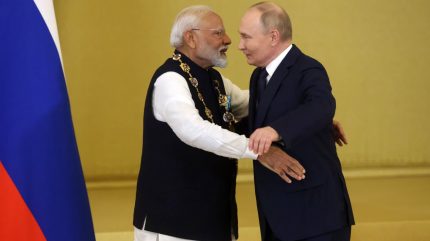
Indian Prime Minister Narendra Modi will visit Ukraine on Friday (23 August) for the first time since Russia’s invasion of the country in a trip presented as diplomatic.
Officials said Modi would relay messages between Ukrainian President Volodymyr Zelenskyy and Russian President Vladimir Putin, who Modi visited in Moscow last month.
Despite Modi’s emotive rebuke of a lethal Russian airstrike on a Ukrainian hospital during that visit, India has faced scrutiny for maintaining ties with Russia.
Modi’s upcoming trip, then, appears to be an attempt to ‘balance the books’. However, as is often the case with India’s premier, there are potential benefits for him at play too – namely a plethora of ongoing Ukraine-India agreements in the gas, defence and agriculture sectors.
Ukrainian gas for Indian warships
Arguably the most significant of these agreements are talks between Ukraine’s state-owned Zorya-Mashproekt and various Indian private sector companies to jointly manufacture gas turbines used by warships.
Modi, Zelenskyy and officials from Zorya-Mashproekt are also expected to discuss the manufacturing of aircraft and airplane engines in India, Bloomberg reported.
Zorya-Mashproekt did not respond when approached for comment by Power Technology.
Even if Modi’s visit to Kyiv will be short due to security concerns, the first visit by an India Prime Minister in 30 years is a significant occasion. It also indicates Modi’s willingness to cajole foreign companies to supply India with the goods needed for domestic manufacturing, in line with his policy of ‘atmanirbhar Bharat’, or ‘self-reliant India’.
India is the world’s largest importer of weapons from overseas, but Modi and India’s richest man Gautam Adani have ambitions to indigenise its defence industry.
Over the last two decades, India spent $60bn on weapons from Russia. These imports have declined steadily from 76% in 2009–2013 to just 36% in the last five years, according to the latest report from the Stockholm International Peace Research Institute.
Non-alignment or profiteering?
Indigenisation and perhaps a subtle pivot away from Russia as the invasion continues have seen India wean off dependence on Russian arms – if not on oil.
Since February 2022, as Russian forces have pushed further into Ukrainian territory and thousands have died, Modi has kept India’s stance firmly neutral, railing against the fighting but refusing to participate in UN resolutions against Russia.
India has profited significantly from its neutrality.
The US and European nations have imposed a raft of sanctions on Moscow, as well as a cap on the price Russia could charge for its oil, in an effort to hurt Russia but keep global supplies steady.
This cheaper oil has found new markets. India now buys nearly two million barrels of Russian oil a day, according to the International Energy Agency.
By importing approximately 45% of its oil from Russia, there is a very credible case to be made that India is funding the Kremlin’s war chest, even if Modi once more shelters under the umbrella of non-alignment.
Zelenskyy may look to poke holes in that umbrella during Modi’s visit to Kyiv. He previously criticised the Indian Prime Minister for hugging Putin in Moscow during the lethal hospital airstrike, a trip also underpinned by energy ties as India sought deals with Rosneft and other leading Russian oil firms.
However, with Ukraine continuing its counter-incursion into Russia’s Kursk region, Zelenskyy is likelier to play the meeting with more diplomatic nous.
At stake is a helpful rise of inflows to Ukraine’s gas sector and wider economy, India’s neutrality and India’s push to indigenise its defence industry.



